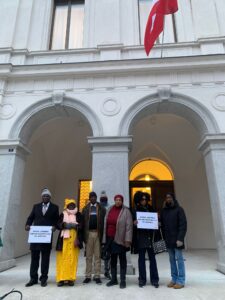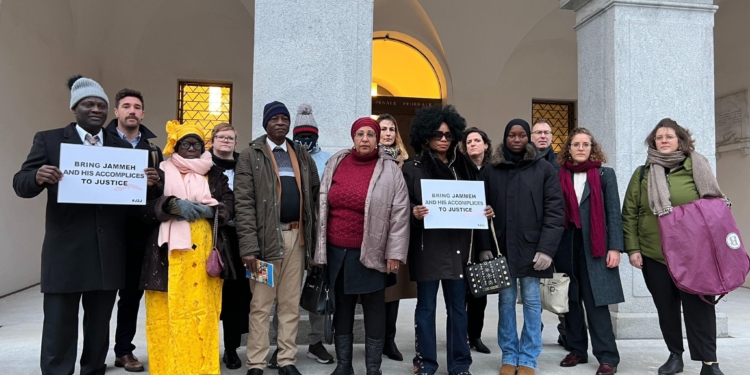The start of the trial of former Gambian government minister Ousman Sonko in Switzerland on January 8 marked another step forward on the long road of the quest for justice for the victims of former president Yahya Jammeh’s regime.
Coming just weeks after a German court in November 2023 imposed a life sentence on Bai Lowe for his role in the activities of the Jammeh-controlled death squad, the Junglers, Sonko’s trial is a ray of hope in the transitional justice process that is expected to bring to book the main perpetrators, including the former president and several high-ranking officials in his administration.
“For 23 days, I’ve been waiting for this day. So, I expect that no matter what, justice will be done. Not just for me; but for my family too. We have been waiting and we never expected to see this day,” said Binta Jamba, one of the victims and complainants.
Victims and justice defenders pushing for justice are hoping that the trials of Lowe and Sonko, and that of Michael Correa, expected to kick off later this year in the US, will give impetus to the transitional justice process in The Gambia, which has been moving at a slow pace since the government received the report of the Truth, Reconciliation and Reparations Commission (TRRC).
Sonko is accused of crimes against humanity
Although the government produced a White Paper largely accepting the TRRC’s recommendations and pledging to implement them, there has been minimal action on the pledge. Talk of instituting an internationalised court to try Jammeh and other former high-ranking officials has yet to produce any concrete results.
Sonko is accused of crimes against humanity, including murder, rape, false imprisonment, and torture, committed between 2000 and 2016. Five of his nine accusers – Binta Jamba, Ramzi Diab, Demba Dem, Madi Ceesay, and Fatou Camara – will for three weeks face him in the Federal Court in Bellinzona, Switzerland. One plaintiff, Nogoi Njie, died in September last year while waiting to testify.
“I feel very happy sharing the same room with a perpetrator, somebody who has trampled on my rights. Looking into his eyes or him turning and seeing me. That made me really proud and happy because psychologically, that’s sending a positive message,” said Ceesay, a member of Parliament, on the first day of the trial.
Ceesay was a journalist when he was arrested and tortured. The Independent newspaper, where he was serving as managing director, was shut down.
The former minister, who turned 55 on January 9, 2024, has denied the charges and instead instructed his lawyer to try to have the case thrown out.
RELATED: Mixed reactions as trial of ex-Gambian Minister Sonko starts in Switzerland
Lawyer Philippe Currat, who has always argued that his client should not be tried in Switzerland for crimes against humanity, outlined his preliminary pleas on the first day of the hearing, raising several issues of procedure, including jurisdiction. He also argued that Switzerland could not try Sonko because most of the charges against him were crimes committed before January 1, 2011, when the law of crimes against humanity was adopted in Swiss law. According to him, Sonko should not be tried for torture because it has not yet been domesticated in Swiss law.
“Ousman Sonko has now been in custody for 2,539 days and the question of whether the Swiss authorities have jurisdiction to prosecute him for the offences of which he is accused has still not been resolved,” he said during his submission.
The three-judge panel hearing the case rejected the application.

She wanted Sonko removed from the courtroom during her testimony
Jamba had the opportunity to stand in court and accuse Sonko of raping her several times after orchestrating the murder of her husband, Almamo Manneh, who was suspected to be involved in a coup attempt to topple Jammeh. Sonko has been accused of being complicit in Manneh’s murder by luring him into an ambush. Manneh was a State Guard and was reputed to be one of the most loyal of Jammeh’s men at the time. The former minister declined to comment on the death, citing the confidentiality of the operation under the Official Secrets Act.
The plaintiff asked that Sonko be removed from the courtroom during her testimony. However, he could watch the proceedings remotely. She described the first time the former minister accosted her when she was alone in her mother’s house and threatened her with a gun when she tried to reject his advances, saying she was still in mourning for her husband and, according to tradition, she could not uncover her head or have sex.
“My kids were out, everybody was out. He locked the door… He pushed me inside the other room where the bed was. He pulled out his pistol, put it on the side of the bed, and told me to take off my headscarf. I was crying. I thought he was about to kill me. He took off his belt.… I was on the bed pushing myself behind, crying. He took the gun and said: ‘If I hear a word from you, I will kill you.’ Then he forced me to have sex. He raped me. He didn’t even undress fully,” Binta Jamba recounted.
She told the court that Sonko turned her into his sex slave, attacking her several times in 2000, 2001, and 2005 and twice making her have an abortion. Abortion is illegal in The Gambia.
The former minister denied the charges, claiming that from January 2001 to January 2002, he was on a peace mission in Sierra Leone.
ALSO READ: Swiss court charges Gambian ex-minister Ousman Sonko with crimes against humanity
The second rape victim, who asked that her real name be concealed and was instead referred to as Fatou Ceesay, was accused of involvement in a foiled coup led by the then-Chief of Defence Staff, Colonel Ndure Cham. In the aftermath of the attempted coup, several people, both military officers and civilians, like Fatou Ceesay, were rounded up.
She said Sonko, as police chief, sat in one of the panels composed of various heads of security institutions and supposedly mandated to investigate the coup. However, subsequent investigations, including the one by the TRRC, have established that the panels’ main role was to force confessions usually with the help of the Junglers, who would beat and torture suspects into submission.
“They took me to a room. They removed my glasses, put a plastic bag over my head, and started beating me from all directions. That went on for a long time. They do this until you can’t breathe, said Fatou Ceesay, claiming that she was then raped by one of the Junglers.
“One of them came in and turned off the light,” she said. “The whole room was dark. I thought I was going to be beaten again. I saw a Jungler with a mask. He jumped on me… He raped me.”
Another witness accused Sonko of enabling Jammeh’s dictatorship.
While testifying about his alleged torture while in custody in connection with the 2006 Ndure Cham-led foiled coup Lieutenant Colonel Bunja Darboe, a serving officer in the Gambian army, said Jammeh’s government was a dictatorship.
“There were a lot of human rights violations. Jammeh had a lot of enablers. Ousman Sonko was one of them,” he told the court after describing how he was tortured and made to write a statement implicating himself in the coup.
Lt Col Darboe was subsequently convicted of involvement in a coup and sentenced to life imprisonment by a court martial. He was pardoned and released in 2017 – and reinstated in the army – following the change of government.
I promoted human rights – Sonko
While giving his preliminary testimony, Sonko complained about the prison conditions under which he had been held in Switzerland for almost seven years since his arrest in January 2017, claiming that his health had been affected. During cross-examination, he said his eyesight had been damaged due to being held for long periods in solitary confinement in a poorly lit room.
“Some counsels took to the podium to criticise The Gambia and the government at the time. I urge them to look in the mirror because I do not think Switzerland is qualified or competent to judge anyone on human rights,” he said.
He blamed the poor conditions in most African prisons on colonialism and claimed that as Interior Minister, he had tried to improve the prison system in The Gambia and promote human rights.
He cited his 2014 invitation of the two UN special rapporteurs on torture and extra-judicial executions – Christof Heyns and Juan Méndez – who were offered a guided tour of the Gambian prisons but suspended their visit when they were barred from the security wing of the Mile 2 prison, which housed death row prisoners.
Sonko’s daughter, Olimatou Sonko, is on the defence team. She has previously been quoted as saying that she believes “they are prosecuting the wrong guy”. “I cannot predict what will happen, but we are hoping that at the end of the day, he is found innocent.”
RELATED: Selective approach to TRRC recommendations a sure recipe for defeating justice
One of the drawbacks of the trial in Switzerland is that, like Bai Lowe’s in Germany, it is being conducted in German. This is a big disappointment for the Gambians and other parties interested in the case. Several requests to have the proceedings translated into English failed.
The former minister was arrested in January 2017
Sonko was a long-standing member of Jammeh’s inner circle. He served as the commander of the presidential guards in the early 2000s. In 2005, he was appointed Inspector General of the police. That year, more than 50 West African migrants, mainly Ghanaians, were arrested and killed by the Junglers. The police orchestrated an elaborate cover-up of the mass killings.
Barely a year later, Sonko was elevated to the position of Minister for Interior, a position he held until February 2012 and from May 2012 to September 2016, making him one of the longest-serving ministers in Jammeh’s administration.
Sonko was dismissed just three months before the 2016 presidential elections, which Jammeh lost. The fallout between Jammeh and Sonko came as a surprise to many. The former minister fled to Switzerland where, in January 2017, he was arrested after Trial International filed a complaint against him for his role in the atrocity crimes in The Gambia.
Sonko is the second person to face crimes against humanity charges under universal jurisdiction laws in Switzerland. The first, Alieu Kosiah, a Liberian war-time rebel commander, was convicted in 2022 and is serving a 20-year sentence.







